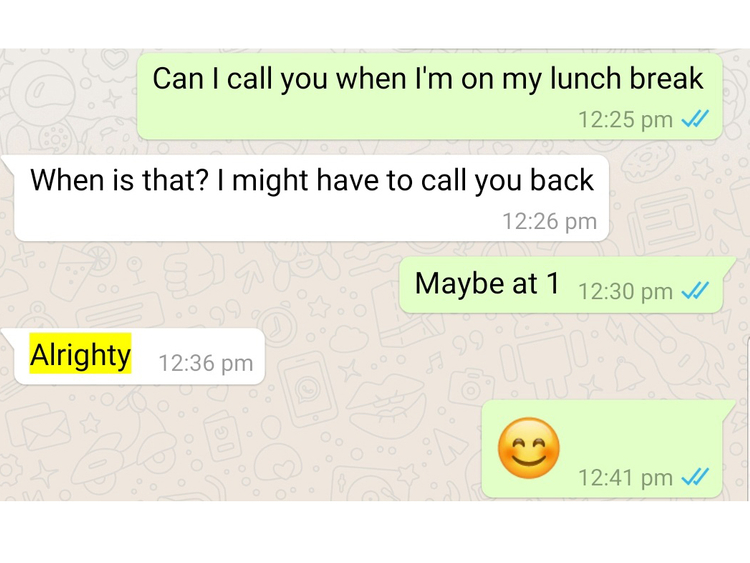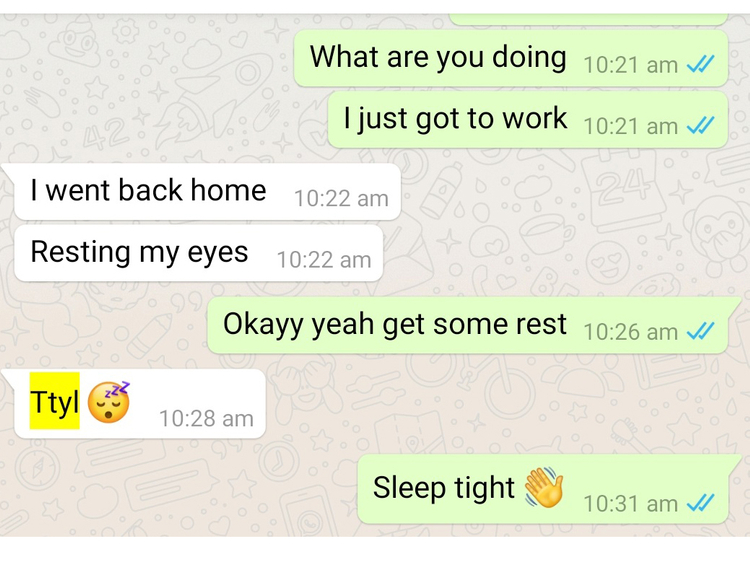
Highlights
- The word, textlationship was recently added to a top online dictionary,
- Are UAE residents in textlationships? Millennials responded
- What are the commonly used text words
- How has texting changed English language, a lexicographer weighs in
Welcome to 2019: A time where technology has made our life so easy that it allows us to talk to people all the time, without having to actually meet them. And believe it or not, most of us have relationships that start and end in cyberspace.
Welcome to the modern-day relationship, or should I say, ‘textlationship’.
Confused?
You’re probably in one and you don’t even know it.
Take a look at some of the popular applications you use to text or message people. Out of the people you message and talk to, try and remember how often you’ve met them or speak to them. If you haven’t physically seen someone in a long time then you’re in a relationship that is only based on text message.
Definition
According to dictionary.com, a top online dictionary, a textlationship or texttationship is defined as a relationship, either friendly or romantic, in which people text or message each other often, but rarely interact in person. The word fuses ‘text’ and ‘relationship’.
We live in the social media generation where individuals spend countless hours of their day on online platforms. According to US-based newspaper The New York Times, “800 million people use Instagram, for more than 30 minutes a day on average”. Additionally, international statistics show that about 18.7 billion text messages are sent worldwide every day.

We are so comfortable with texting that physical interaction has taken a back seat for some people. While texting can help with sending quick messages, making plans and checking in on people, our over-reliance on it has replaced personal interactions and real connections.
Are UAE residents in textlationships? Millennials responded…
Yes and no.
Sharjah resident Sameed Khalid is in a relationship with a “minority” of people over text.
The 22-year-old mechanical engineer said: “Some of [the people I know] live abroad while others are based in the UAE. I think texting helps keep people in touch, especially if they live thousands of miles away. I can’t meet them even if I want to because of the distance.

I think texting helps keep people in touch, especially if they live thousands of miles away. I can’t meet them even if I want to because of the distance.
“However, for those who live in the same city, it creates broken relationships among people.”
He said he tries not to have a text-only relationship with people and meets friends two to three times a week. “I believe true emotions and understandings can be shared when people interact face to face, which is why I do not prefer texting.”
Behavioural therapist Mehak Madaan is not a fan of texting either, and prefers to meet people face-to-face. She said: “I choose talking on the phone over texting any day. It is a faster way of getting things done. You can hear a person’s voice, excitement and oh, no sore thumbs. What’s not to love?”

I choose talking on the phone over texting any day. It is a faster way of getting things done. You can hear a person’s voice, excitement and oh, no sore thumbs. What’s not to love?
While she agrees that texting helps people stay in touch, the 24-year-old values personal interactions.
“I feel like talking on the phone is easier as opposed to texting the person but essentially, the phone is still a barrier... While you can hear their voice and tone, meeting people is more intimate.
“When I talk or text someone, the television is usually on or I am doing other tasks. When you meet someone, there is less room for distraction. Maybe I’m oldschool like that, I meet up with everyone I text.”
Like Madaan, Sharjah resident Wasif Naushad proudly states that he is not in a text-only relationship with people. The 23-year-old Pakistani national told Gulf News: “Texting is a great way to keep in touch with friends, however it lacks the same connection you would have, if you were meeting a person face to face or speaking to them over the phone.”

Texting is a great way to keep in touch with friends, however it lacks the same connection you would have, if you were meeting a person face to face
The word and concept became popular online as it was commonly associated with dating applications and how people meet each other virtually, but not in person.
Twenty-four-year-old Chirag Makhija understands why most people prefer textlationships with people they meet on apps or online platforms.
He said: “This kind of concept is different on dating applications because there is some sort of skepticism that comes with people you don’t know. You want to take it slow and establish a textlationship with them first.” The Indian businessman added that sometimes these relationships can work, provided you find the right people.
Wasif Naushad said: “I have not used a dating application, so I would not know. However, I have interacted with people on social media platforms such as Twitter and Instagram, without ever meeting them in person.”
According to some residents, textlationships are not all that bad. They allow people to avoid forced interactions and keep in touch when it is convenient.
Omani national Liyana Al Abdul Salam keeps in touch with friends and family back home through text, and when it is difficult to meet people because of work. She said: “It also lets me talk to people occasionally I don’t necessarily care about enough to want a proper relationship with.”
It also lets me talk to people occasionally I don’t necessarily care about enough to want a proper relationship with.
Liyana, 22 years, admitted that if she is in a hurry, she prefers talking on the phone. “Even though texting is convenient, I hate late replies. I often reply late too, but if I need something I rather call the person.”
Is society to blame for the need to text?
With everyone’s busy lives, the focus on physical interaction finds itself on a backbench. Some individuals prefer text to meeting, and vice versa, which leaves a lot of room for adjustment and compromise. People who do not prefer being in a textlationship, might be forced into it.
Naushad does blame society for putting pressure on people to text more than meet.
He said: “It has become a norm in society, which is something I don’t like to see. People don’t even hang out anymore, they rather just text.
“I really wish people went back to catching up with people over coffee or a phone call, rather them dropping them a text.”
Twenty-three-year-old Jumana Adel thinks texting has “made it easier to become impersonal” and that “technology has facilitated” the process. However, the corporate finance trainee does not think texting is completely “emotionless”.
She said: “I don’t think texting is devoid of intimacy. In fact, I think many people find that they express themselves better through text.”
I don’t think texting is devoid of intimacy. In fact, I think many people find that they express themselves better through text.
Madaan agreed to the same idea and said: “If someone is more comfortable typing out something to someone instead of saying it out loud, does it make it less personal? Communication is still intact; it’s just the form that’s different. It helps break down initial barriers, especially for introverts.”
Psychology master’s student Farheen Hassan does not blame society for what should be termed as an “individual choice”. She said: “We are all adults and we make our own choices about the way we want to live our life.”
The 23-year-old Dubai resident added that her busy life “makes” her chose texting close friends as opposed to calling or meeting them.
“Texting has made it a lot easier for us to hide behind a phone and avoid important conversations”, which is not the right way to deal with relationships and issues. She acknowledges that texting is more convenient but is sure that “textlationships are not enough to build sustainable relationships”.
Texting has made it a lot easier for us to hide behind a phone and avoid important conversations
Emirati national Salman Shafiq prefers meeting people but does not manage to in day-to-day life. The 23-year-old said: “Texting has become a part of everyone’s life. It is much easier to get in contact with people, but I think texting has made us impersonal. The feeling of genuineness is completely gone.”
... texting has made us impersonal. The feeling of genuineness is completely gone.
Are sustainable textlationships possible?
Most people agree that maintaining successful relationships solely based on text are not possible, but there are exceptions.
According to Mehak Madaan, texting and being a part of textlationships can work if there is “an already established relationship”, where not meeting the other person often is acceptable only because the relationship is strong.
She said: “It is a great way to check in with friends and family, especially when schedules don’t permit, but it’s in no way a replacement” for personal interactions.
Farheen Hassan has no limit on the amount she texts but agreed that “important conversations, birthday wishes and sharing good or bad news” has to be done over the phone, or in person to maintain “the connection in a relationship”.
Though rare, some people have managed to maintain successful textlationships with people. Chirag Makhija is one of them.
He said: “I actually became friends with someone through a friend, without meeting them. We would text or message very often. Despite meeting after two years of getting to know each other, I think we are good friends. We managed to establish a relationship only through texting. If there was something major happening in my life I would make it a point to let her know.”
Salman Shafiq neither agrees or disagrees with the notion and told Gulf News that the strength of the relationship depends on the “frequency and urgency of each text”.
“The longer the relationship goes on with infrequent texts, the less likely it is that the relationship will last long.”
19 words commonly used while chatting
If one has ever texted or even used a phone, they would be aware of the commonly used abbreviations and words like ‘LOL’ and ‘BRB’ but here are some that you might have not known if you aren’t extremely text savvy.
- IDK/ IDM/ IDC – I don’t know/ I don’t mind/ I don’t care
- BTW – By the way
- TYT – Take your time
- BRB – Be right back
- SMH – Shaking my head. This often signals someone’s disappointment.
- LMK – Let me know
- ASAP – As soon as possible
- WDYM – What do you mean?
- HBU/ WBU – How about you?/What about you?
- HF – Have fun
- Sup –It’s short for ‘what’s up?’. It’s typically used as a greeting or a conversation starter.
- Thx – Thanks
- Cool – Usually used in agreement with an idea.
- Later – Indicates that the conversation or interaction will continue later and is reaching an end for the moment.
- Yup/ yep – Used in place of ‘yes’.
- Alrighty – Texting slang for ‘alright’
- K – Another form of ‘OK’. It can indicate ill feelings, disagreement or sarcasm.
- Kthxbye – It’s short for ‘OK, thank you, goodbye’. Usually indicates an abrupt end to a conversation.
Texting lingo is especially common amongst youngsters. It’s easy to use and facilitates fast paced conversations that take place online in today’s rapidly moving world. Here is what some young people think about using text jargon on a daily basis and how it might be impacting the evolution of language.

...it’s quick and easy. It is part of the [youngster] culture now
“One of the reasons why I use short forms and texting words when I speak to my friends over chat is because it’s quick and easy. It is part of the [youngster] culture now,” said Nida Gulzar, an 18-year-old pupil.
Huzaifa Hameed, a 22-year-old student, explained how the set of words used online might have evolved and come into existence: “I believe that texting removes a lot of social consequences as compared to verbal or face to face communication, which contributes to the main difference in the use of language.”

I believe that texting removes a lot of social consequences as compared to verbal or face to face communication
Student Emen Ali had similar thoughts: “Such language had to be developed because the context is entirely different [while chatting] in which we are having a conversation as in it’s not face to face and the proper pronunciation is of less concern and swiftness to reply is more important.”
The 18-year-old based in Ajman said that the form of language could be a threat to formal communication. She said: “Death and coinage of certain languages especially English language is at high risk due to this. Due to the technological advancement and ease of abbreviations majority of the population is using such language for its convenience if not for the trend.”

Such language had to be developed because the context is entirely different
However, many others believe that such jargon will not affect standard language. “I think that we will continue to use abbreviations and words online which will never be a part of formal language,” said Gulzar, a Sharjah resident.
Similarly, Abu Dhabi resident Hameed thought that holding onto traditional language is necessary: “It is important to preserve our standard form of cultural language, because it keeps our integrity as a people. The importance of intangible cultural heritage is not the cultural manifestation itself but rather the wealth of knowledge and skills that is transmitted through it from one generation to the next, which includes language.”
However, the youngsters admitted to using texting slang for majority of their interactions online.
Speaking about what words they most use while chatting, Gulzar said: “I use words to direct the conversation the most. If I am in a hurry, I’ll type ‘BRB’ or if I can’t talk that time, I’ll write ‘TTYL’.”
Whereas, Hameed begins his conversations with such terms. “I usually start conversations with ‘sup’ or ‘WYD?’ [What you doin’?].”
A lexicographer on how language is changing with new usage?
When my friend recently texted me: “Do u wanna order smthng? Imma get a coffee”, it was not hard for me to understand what she meant. Texting has changed the words we use to communicate, and the new usage has trained us to read an otherwise senseless sentence mostly devoid of punctuations or complete words with meaning.
An I for an I, a “U” for a ‘you’
It’s all about shortening! From removing vowels from words to abbreviations like IKR (I know, right), texters are shortening commonly used words and sentences for convenience.
We spoke to a lexicographer, to find out how texting has changed language.
Daniel Brandon, an associate editor at Merriam-Webster, Inc. told Gulf News: “Speaking in general terms, it is undeniable that texting has had an influence on the English language, but it’s important to remember that the English language has been around (in one form or another) for quite a few centuries. Even ignoring the older, less familiar forms of the language, a modern English speaker can easily understand things written 500 years ago. A technology that has only been around for a couple of decades will be hard pressed to make much of an impact against that sort of history.”

Even ignoring the older, less familiar forms of the language, a modern English speaker can easily understand things written 500 years ago. A technology that has only been around for a couple of decades will be hard pressed to make much of an impact against that sort of history.
The lexicographer, based in Springfield City in Massachusetts, added: “Where texting is having an impact is less in overall grammar or usage and more simply in vocabulary. We are seeing a great deal of evidence of abbreviations like ‘SMH’, ‘LOL’, ‘BRB’, and so on making their way into the general lexicon, appearing now even in traditional publications like the New York Times or Newsweek. Certain condensations that were popularised by online communication are also beginning to appear in more conventional contexts (‘fam’ for family, ‘feels’ for ‘feelings’, ‘adorbs’ for ‘adorable’ and so on).
Is this a drastic change?
Brandon added: “I would be reluctant to call this a drastic change, however. Any significant new technology tends to lead to new vocabulary, in order to describe both the thing itself and the way in which we use it. The advent of computing in the 1950s ultimately had a similar impact on language, as did the introduction of the mass-market automobile in the 1920s. Right now, that significant new technology is the smartphone, and only time will tell how many of the fad words of the 2010s will establish themselves permanently in English.”
Is language getting worse?
According to an article, Is the English language changing?, edited by American Linguist Betty Birner and published by the Linguist Society of America: “People tend to think that older forms of languages are more elegant, logical, or ‘correct’ than modern forms, but it’s just not true. The fact that language is always changing doesn’t mean it’s getting worse; it’s just becoming different.”

Birner gave an example: “In Old English, a small winged creature with feathers was known as a brid. Over time, the pronunciation changed to bird. Although it’s not hard to imagine children in the 1400’s being scolded for ‘slurring’ brid into bird, it’s clear that bird won out. Nobody today would suggest that bird is an incorrect word or a sloppy pronunciation.”
The article further clarified: “The speech patterns of young people tend to grate on the ears of adults because they’re unfamiliar. Also, new words and phrases are used in spoken or informal language sooner than in formal, written language, so it’s true that the phrases you may hear a teenager use may not yet be appropriate for business letters.”











